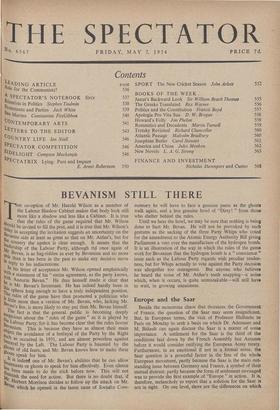BEVANISM STILL THERE
IHE co-option of Mr. Harold Wilson as a member of the Labour Shadow Cabinet makes that body look still more like a shadow and less like a Cabinet. It is true should that the rules of the game required that Mr. Wilson delay be invited to fill the post, and it is true that Mr. Wilson's b in accepting the invitation suggests an uncertainty on the the side at least as great as that on Mr. Attlee's, but for ,'e country the upshot is clear enough. It means that the leadership of the Labour Party, although rid once again of T.. . Bevan, is as hag-ridden as ever by Bevanism and no more able than it has been in the past to make any decisive move In to his indiscretions. with his letter of acceptance Mr. Wilson opened emphatically 1 a statement of his " entire agreement, as the party knows, liwith Aneurin Bevan." He thus himself made it clear that b. the. is Mr. Bevan's lieutenant. He has indeed hardly been in 1,1s sphere long enough to have a truly independent position. Lite rules of the game have thus promoted a politician who illelittle more than a version of Mr. Bevan, who, lacking Mr. The fire, is more likely to stay put than Mr. Bevan himself. 61114 fact is that the general. public is becoming deeply sPicious about the " rules of the game " as it is played by . !Jae, Labour our Party, for it has become clear that the rules favour Z.varlism. This is because they have as almost their main siect the avoidance of a betrayal of the Party by the Right uv c11 as occurred in 1931, and are almost powerless against traYal by the Left. The Labour Party is haunted by the 0,(38ts of old fears, and Mr. Bevan knows how to make these ot,asts speak for him. lieutenants is indeed one of Mr. Bevan's abilities that he can allow Cutenants or ghosts to speak for him effectively. Even silence diminish s been made to do the trick before now. This will not mentary he will have to face a genuine panic as the ghosts walk again, and a less genuine howl of "Dirty ! " from those who shelter behind the rules.
Until we hear the howl, we may be sure that nothing is being done to hurt Mr. Bevan. He will not be provoked by such gestures as the sacking of the three Party Whips who voted for the amendment to the Atomic Energy Authority Bill giving Parliament a veto over the manufacture of the hydrogen bomb. It is an illustration of the way in which the rules of the game work for Bevanism that the hydrogen bomb is a " conscience " issue such as the Labour Party regards with peculiar tender- ness, but for Whips actually to vote against the Party decision was altogether too outrageous. But anyone who believes he heard the noise of Mr. Attlee's teeth snapping—a noise which, when it occurs, is quite unmistakable—will still have to wait, in growing uneasiness.










































 Previous page
Previous page